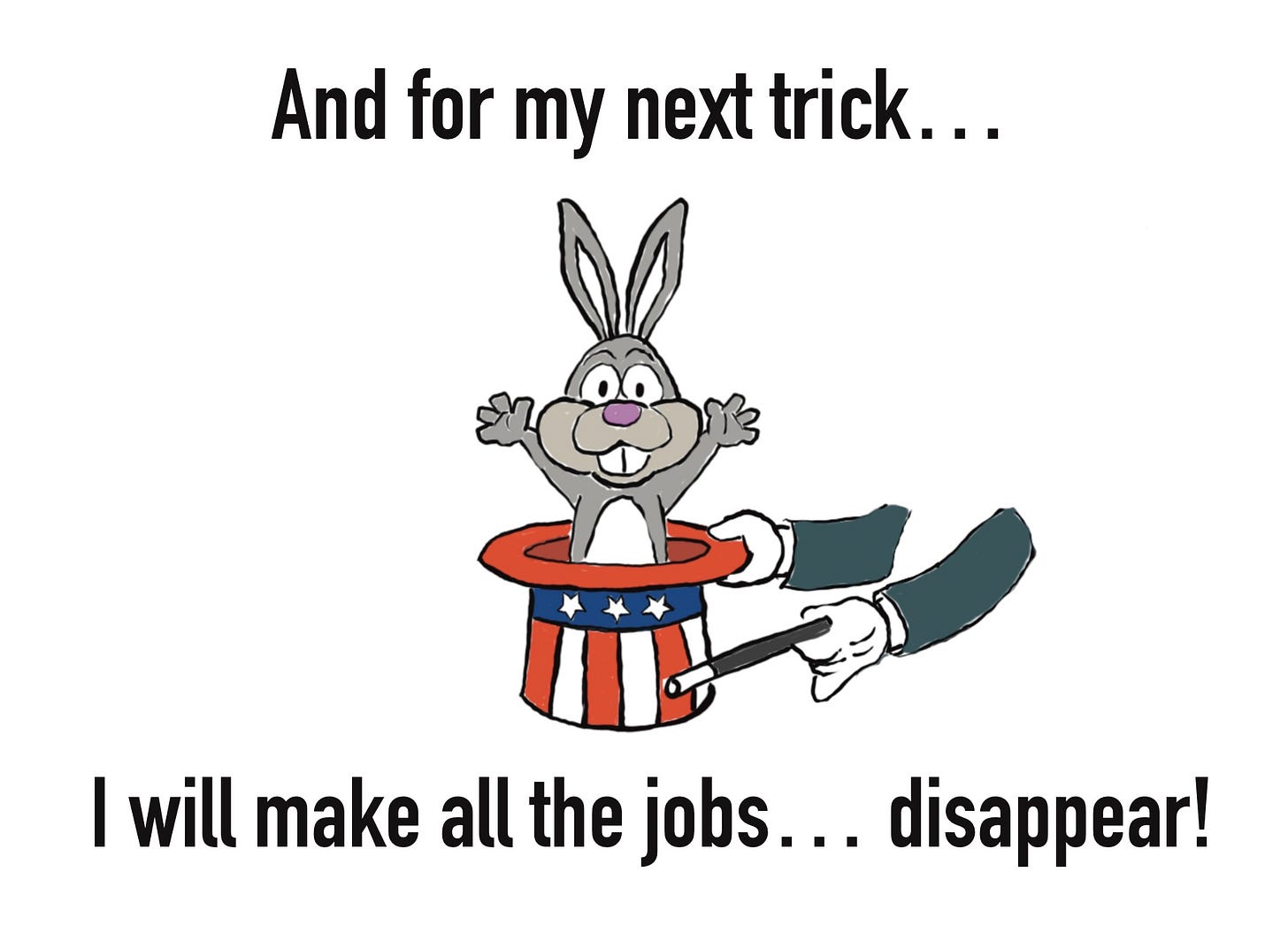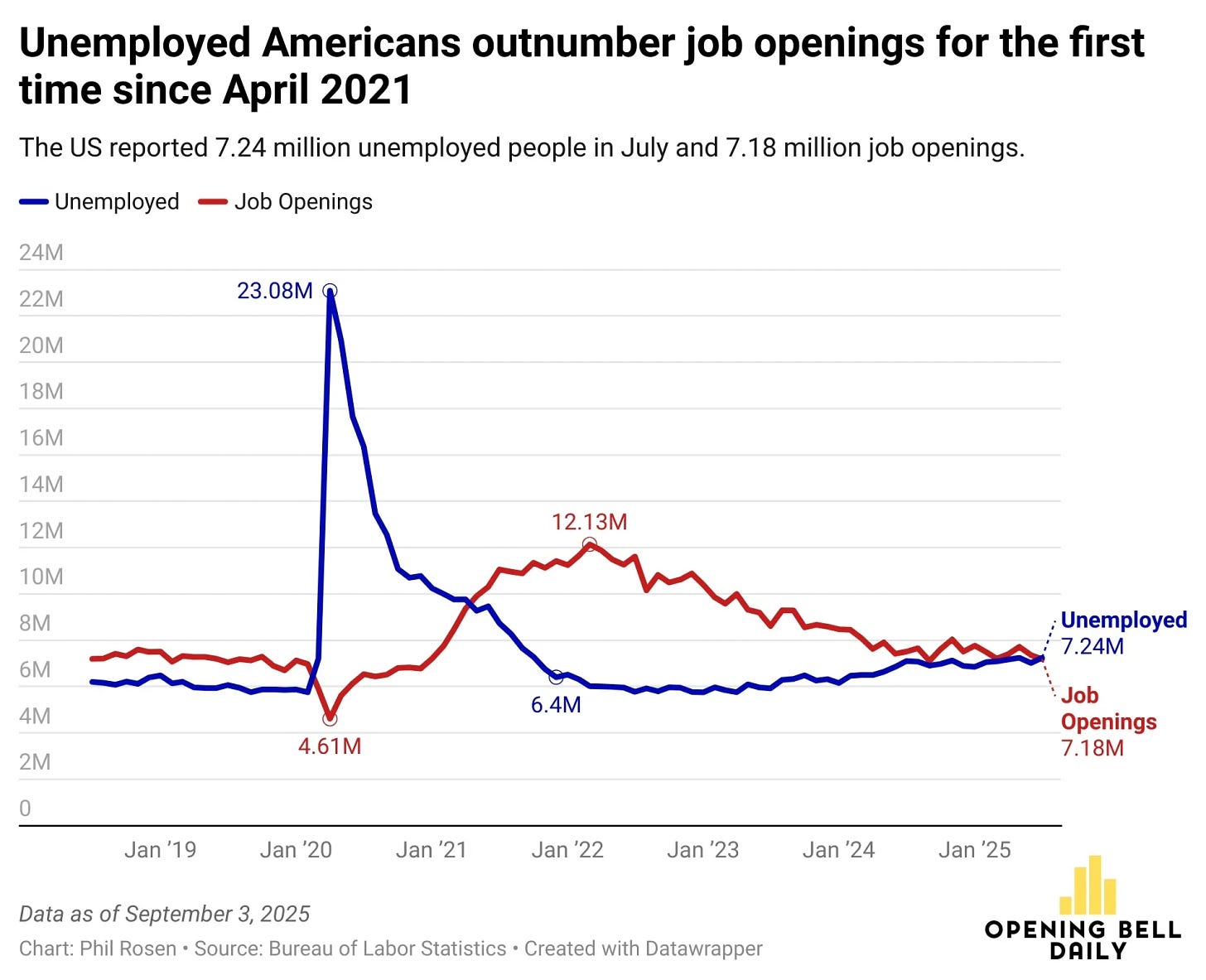Is the job market all an illusion?
Why entry-level opportunities are vanishing while job-seekers keep multiplying, and what we could do about it.
The way I see it, we’re caught at the intersection of two difficult realities in today’s job market: genuine entry-level opportunities are becoming increasingly scarce, and for the first time since April 2021, the number of job-seekers has surpassed the number of available openings.
Where did the entry-level jobs go?
I’ve discussed before on the competition that’s been increasing in the job market, with more and more job-seekers holding 4 year degrees, and how degree-holders are outpacing the number of jobs available which require them. This has created a market where employers can demand more from their large pool of applicants without any give on their end. They know jobs are high in demand, so they increase the requirements to qualify for the role. An employer’s market.
Things have escalated quickly though. Now - 35% of entry-level jobs require three or more years of experience.
I hopped on LinkedIn’s job search to investigate, which showed about 4 million job postings in the US. When I updated the filters to just “entry-level” jobs, it slimmed down to 2 million jobs. I’m curious about the criteria LinkedIn uses for labeling jobs as entry-level or not, because my gut is telling me that half of the jobs in the US likely aren’t entry-level.
Where did the entry-level jobs go?
They’re right here, silly! See? All 2 million of them!!
What the job search doesn’t tell you is that many positions are simply being relabeled as entry-level to cut costs and pay less, while still expecting the same experience and skills as someone who’s been in the industry for years. Because, why not? Who’s stopping them from labeling any job they want as entry-level when they know how desperate people are to find work? They may say they’ll consider transferable skills, but will they? And if they don’t?
We’ve been seeing this for a while and job-seekers are well aware of this issue. It’s a well-used joke that you need to be young but also have at least 10+ years of relevant experience to land your first entry-level position.
We laugh through the tears… and I haven’t even touched on the lack of pay transparency or the unpaid assignments applicants have to do for some jobs.
A report from the National Association of Colleges and Employers showed that 51% of hiring managers believe relevant, on-the-job experience is the most important indicator of a quality hire, over educational attainment, yet only 20% of employers say they provide on-the-job upskilling. *deep breath* The hypocrisy is infuriating, yet not surprising. It leaves people entering the job market scattered on how to gain experience, as employers require said experience, but no one is offering it.
There are risks that employers have to consider when hiring new workers entering the workforce. There’s often high turn-over, long learning curves, and resources required to hire and train new employees. The average hard cost per new hire is about $4,700 (2022 data), including hiring and training, but it is more difficult to measure true costs if considering when the new employee will begin adding genuine value back to the employer.
Employer’s are hesitant to take on these risks, especially when they can outsource certain tasks to AI and poach good candidates from other companies. They’re even hesitant to bring on interns, with internship postings down by 11% in 2025, compared to 2024.
Everyone has to start somewhere. Employers have always needed to hire new people to the workforce. So the question becomes, what is the hold up now? When did the risks become too much?
A more important question is - what will be the long-term effects of an under-developed workforce?
I can’t answer all those questions, but I do know that if left unsolved, problems will worsen. Employers are focusing on solving short-term problems (quarter over quarter profits for shareholders, risk mitigation), rather than looking ahead at their own talent pipeline. They’re creating a workforce gap that will be very challenging, for employers and government, to address in the future if not addressed in the present. Businesses that fail to adapt and develop their own workforce will struggle later to attract the next generation of talent.
Many employers are already facing these challenges, stating that their biggest struggle in the hiring process is finding “quality applicants.” Hmm…
Where did… all of the jobs go?
If you zoom out a bit… you notice that it’s not just young college grads clutching their pearls [degrees]. The problem has spread to all levels in the workforce.
Job openings in the US have been on the decline, and now for the first time since April 2021, the number of unemployed people is higher than the number of job openings. The updated Fed’s job report for July showed 7.24 million people unemployed and 7.18 million job openings. June experienced net job loss, and it’s expected that future job reports will revise the July numbers to show the same.
The difference between April 2021 and now is that back then, the unemployment rate was 6.1%. Now, we have more unemployed people than job openings, but with an unemployment rate of 4.3%. Of course, there are many intricacies and details to consider, but essentially the jobs available have been shrinking faster than the rate that unemployment has risen. The jobs are disappearing. ✨Poof ✨
Ask any job-seeker what their experience has been like searching for a job. They’ll likely tell you they’ve applied to hundreds of positions, been ghosted by most, interviewed for a few, then were passed up for an internal candidate the company was going to promote the whole time.
We all know the federal job cuts are a major contributor to the job losses, but that’s not the only factor here. Industries across the board are cutting jobs.
With these updated job numbers, it’s likely that the Federal Reserve will cut interest rates by 0.25-0.5% at their next meeting this month to help stimulate the economy. Theoretically, this will make it easier for businesses to reinvest in themselves, and hopefully create more jobs, if that helps their bottom line. The problem with theory though is that… it’s only theory. Contingent on the factor that it is interest rates holding back employers from creating more jobs.
Will the freed up money be reinvested to create more jobs? Are there enough incentives for businesses to want to create more jobs?
Who’s to say this won’t create more incentives for businesses to streamline and support their bottom line, which is to appease shareholders?
Do the shareholders want more jobs? I haven’t asked them yet.
How these problems compound.
The problem isn’t only a lack of realistic entry-level jobs, now the problem is a lack of all jobs. The path to gaining experience as newbies in the workforce just got harder, with people experienced in the workforce competing for the same open jobs.
Cutting interest rates helps free up some capital, theoretically, but the risks discussed earlier that employer’s face now stretch to all hires. Freed capital is only one incentive, but there are multiple factors contributing to these problems that will need to be addressed. Multi-faceted problems need multi-faceted solutions.
If businesses continue to streamline, cut jobs, and redirect investments into generating more profit to appease shareholders, hiring new talent will be out of the picture. Hiring any talent will be out of the picture.
It’s a massive mess, and not one that mimics prior employment slow-downs in US history. And while job-seekers are the ones facing the challenges now, everyone will feel the effects of it in the future. Companies can’t continue churning profit if consumers are operating from a scarcity mindset due to lack of jobs and income.
Reduced profit = more layoffs. The problem becomes a negative feedback loop, spiraling downward.
Lowering interest rates could help, but massive messes require innovative solutions.
Policy recommendations, since you asked.
Beyond lowering interest rates, government must address these problems from multiple angles. New angles. Different angles. Creative angles.
While I don’t think anyone in government is reading my substack… yet (though please let me know if you are), if someone in government did ask me what my policy suggestions would be for top-down solutions, these are what I would recommend to get the ball rolling:
Payroll Tax Exemptions for New Positions Created
In the US, employers pay a payroll tax for each employee on their payroll, typically about 7.65% of each employee’s wages (6.2% in Social Security tax and 1.45% in Medicare tax). Social Security caps at $10,453, but Medicare tax has no cap. Employers also pay unemployment insurance taxes that will vary from state to state (which I talked about here). So, if an employer has an employee who makes $60k a year, the employer will pay $4,590 per year in payroll taxes for that employee.
To incentivize employers to create more jobs, one solution could be exempting employer’s from paying payroll taxes on new positions created within the company. In order to make the solution more sustainable, the new hires would be exempt from the payroll tax for two years. Employers would need to demonstrate the validity of the added role/job, and not include just any new hires to backfill positions.
For a new position earning $60k, that would mean the employer would save $9,180 in payroll taxes over two years, not including potential savings from unemployment insurance taxes. Additional incentives could be created for hiring people who are currently receiving unemployment.
While this idea isn’t completely groundbreaking, government is already paying out individuals receiving unemployment. Once the individual is hired, they stop receiving unemployment. Of course, government cost savings in unemployment payments doesn’t immediately translate to money being easily reallocated to Social Security and Medicare to make up for the exemptions - government budgets don’t work quite like that. But, the individual now living off of their income rather than unemployment can become a good tax-paying citizen again, able to contribute back to society and resume their rightful role as a consumer.
The cost savings for an employer creating a new position at $60k might not make the position affordable for the employer, but on the other hand… it could be enough for them to start reinvesting in their workforce, especially with lower interest rates. It could especially help out the small to medium sized employers looking to grow their workforce. Employers love loop holes and tax exemptions.
There would be many details to work out in a policy/program like this (I’m not going to write hundreds of pages of policy implementation right now, sorry), but a policy like this would be worth consideration.
Standards for Job Postings / Protections for Job-Seekers
In the US, we are all aware that we are essentially statistics and numbers to government. In a country of this size (340 million), I don’t expect the government to constantly worry about my wellbeing. Though I wish they did a little, because just a year ago I went through three interviews and an assignment for a local gov position I applied for… just to be told they liked me but that I was under-qualified - BUT that they would still consider me for the position, just at 30k less than originally stated. Ouch.
But, as people who can work, want to work, and have trouble finding it, there could be further protections for job-seekers. There are protections we have fought for through the Labor Movement, but those protections cover current workers/employees. As soon as you lose a job, the only protection you get is six months of welfare.
So, what would it look like if protections were expanded to job-seekers?
There are countless scams out there targeting job-seekers. Fake job postings, data mining, arms-race requirements for entry-level positions, etc. This is where government oversight would come in.
I’m not talking about anything crazy, but what if job postings would get flagged if they required more than 2 years of experience for a position listed as “entry-level”?
I’m not typically first in line to advocate for more government oversight into the private sector (actually that depends), but when it comes to job search engines and boards, there could be restrictions on what companies can label as “entry-level” positions on a job posting.
One suggestion is they must require less than 2 years of experience in the specified field of the role. They could look for equivalent skills or a certain type of certification or schooling obviously, but there would be structure over how a position is listed. It would act similarly to consumer protection laws, but they’d be job-seeker protection laws.
This wouldn’t solve every problem, but it would hold employers accountable to posting jobs transparently. This might not create more sincere entry-level positions, at least not initially, but it would better help inform job-seekers on the positions they’re applying for. Employers would be more careful in how they post jobs and what they’re looking for in a qualified candidates. It would start with transparency, and naturally candidates would begin to gravitate toward (reward) employers who are genuine.
Similar standards could go for other aspects of the job posting, like clearly listing salary *cough cough,* benefits, or task expectations. This would also reduce the risk of turnover for the employer. When expectations are clear, job-seekers can make better informed decisions on the type of job they’re agreeing to.
If government didn’t get involved, this type of policy could be implemented by job boards themselves (bottom-up). Job-seekers could flag postings or employers who break the rule, and multiple flags could lead to employers getting banned from the platform. The incentive for job boards would be that more job-seekers would prefer their platform over others who didn’t have this type of transparency policy in place. If one job board implemented these policies and started generating more traffic than competitors, competition could increase in attracting job-seekers through honest job postings. Transparency would be naturally rewarded by the market (job-seekers).
Being jobless doesn’t make someone worthless. Job-seekers want to find honest jobs without the scams and misinformation.
Being jobless makes people vulnerable and more susceptible to exploitation. The goal for government should be to help people get back on their feet so they can be good, tax-paying citizens again. Dishonest job postings don’t help people get back on their feet. The path to becoming a good, tax-paying citizen again could be expedited if there was more transparency and integrity in the job search.
P.S. If any silicone valley investors want to sponsor my idea for a good honest job board like this, hit me up. I think the 7 million job-seekers would be very interested.
Throwing it at the wall and seeing what sticks.
Here are some other ideas I want to throw out there as potential solutions:
Limitations on student loans so that people are incentivized to consider other careers paths not requiring degrees - would help balance the workforce and decrease the student debt bubble.
Grant programs for employers who offer on-the-job training (bonus for employers who don’t require 4-year degrees).
Turnover insurance for employers who hire people with less experience to protect them in cases of high turnover (this isn’t my favorite idea, but still worth discussion).
Requirements (or grants) for universities to provide training programs (work semesters maybe?) to enrolled students so that they graduate with two years of relevant experience and a degree (like a trade school, but for universities). That way, universities are held more accountable to actually set their students up for success and not just offer empty promises in the form of a diploma.
Government subsidies for “first hires.” Similar to the payroll exemptions idea for newly created jobs, but would offer payroll exemptions for hiring people with zero experience, encouraging employers to take risks on less-experienced talent.
Increased protections or incentives for creating new businesses. Reduce the risk for entrepreneurs so that more people consider starting a business as a viable career option. New businesses = new job creation.
Parting Thoughts
It’s frustrating navigating a job market that has more job-seekers than jobs available. It’s even more frustrating when our voices fall def on the people and institutions who could create change but don’t.
It’s easy to feel hopeless, but I challenge you to hang onto your hope for a little bit longer. Fill in one more job application. Perseverance wins the race. I’ll follow this post up with actions we can take to buffer ourselves in the storm.
I’m cheering for you, and I’ll keep screaming into the void and challenging the people in power if you keep applying to jobs. 🤝
____________
Please use the comments to voice your thoughts on these policy ideas, share your job search story, or scream into the void with me.








